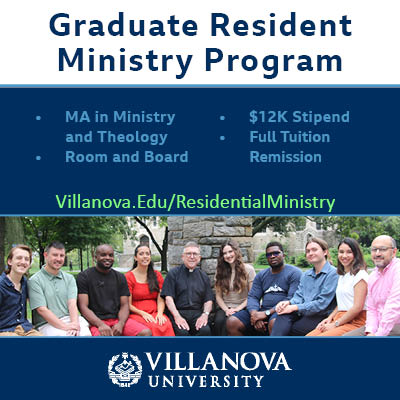Our Commitment
Catholic Volunteer Network respects and upholds the dignity of all persons regardless of the identities they hold. As we expand our conversations and programming with our members about present day structural injustices and their ties to oppressive histories, CVN dedicates itself to pairing those discussions with action to stop our own participation in the systems of oppression.
We believe that creating a just and diverse environment is more than an ideal. These are our core commitments that we invite our members to share:
- We strive to create space for all persons to serve within the CVN community – regardless of differences.
- We welcome persons of every race, religion, culture, age, gender identity, sexual orientation, physical or emotional ability, immigration status, economic situation, and family composition.
- We celebrate all persons regardless of where they may be on their spiritual journey. We value persons of all faith traditions, those with no faith tradition, as well as those who are questioning and exploring.
- We are guided by the light of goodwill, humility, and hospitality as we work to extend volunteer opportunities to all persons in all places.
- Our Christian roots form the foundation of our core commitments. We work to be a community that follows Jesus’ example. We stand in agreement with Catholic Social Teaching, which upholds the life, dignity, and equality of all human beings.
Training Materials for Program Staff
- January 2019: Deeper reflection on our renewed commitment to diversity and racial justice.
Reflection Questions:- How will becoming more diverse and equitable enhance our ministries? How will it change the impact we have on the communities our volunteers/missioners serve?
- Where does racism currently show up in our organization? Which individuals/groups are currently excluded from participating in our programs? What are the barriers to service?
- How does this commitment impact my work focus areas?
- Which of these commitments are we least prepared to carry out? Who can we look to or partner with to help us become better equipped?
- February 2019: Open Wide Our Hearts: How can we respond to the call to repentance and action?
Reflection Questions:- What parts of the pastoral letter stir up something in you? What makes you feel ashamed? Angry? Hopeful?
- How can the church move from words to action in the struggle to end racism?
- Does your volunteer program have historical or social connections to systems of oppression? What can be done to address racism more actively in your program?
- If you think this statement doesn’t go far enough, what would you add to it?
Articles
A History: The Construction of Race and Racism, Dismantling Racism Project, Western States Center
White Mother to a Dark Race, by Margaret Jacobs (Chapter 1)
Building Wealth Timeline, United and Fair Economy
The Ladder of Empowerment, Dismantling Racism Project, Western States Center
The Dynamics of Tokenism, by Margo Adair and Sharon Howell of Tools for Change
Derailing for Dummies
History of Racism and Immigration Timeline, Key Events in the Struggle for Racial Equity in the United States
Racial Microaggressions in Everyday Life
Books
Uprooting Racism
by Paul Kivel, New Society Publishers; Revised, Updated edition, 2017
This resource provides practical tools and advice on how white people can work as allies for racial justice, engaging the reader through questions, exercises, and suggestions for action, and includes a wealth of information about specific cultural groups such as Muslims, people with mixed heritage, Native Americans, Jews, recent immigrants, Asian Americans, and Latino/as.
Racial Justice and the Catholic Church
by Fr. Bryan N. Massingale, Orbis Books, 2010
Massingale reflects on the response of the U.S. Catholic Church to racism over the course of history and advocates for the use of religious tradition to lead to repentance and healing.
The Heart of Racial Justice: How Soul Change Leads to Social Change
by Brenda Salter McNeil and Rick Richardson, IVP Books, 2004
McNeil and Richardson lay a biblical foundation for racial reconciliation and challenges church leaders to work to dismantle the social construction of racism.
Becoming the Anti-racist Church: Journeying Toward Wholeness
by Joseph Barndt, Fortress Press, 2011
Barndt believes that one cannot talk about the impact of racism in a society without including the way race factors into churches within that society. He outlines ways that churches can be a catalyst for change in the world.
Racial Sobriety: A Journey from Hurts to Healing
by Fr. Clarence Williams, Inst for Recovery from Racism, 2002
Fr. Williams presents a process for dealing with racism as a social illness in the human family. The book outlines a treatment program for individuals and groups seeking to recover from the ‘stinking thinking’ of racism. The racial sobriety approach focuses on our white supremacy culture as the source of the various racisms which affects every member of society.
Videos
Misconceptions of Race as Genetic vs. Social Construction Race the Power of an Illusion (created in 2003)
From Episode 1: The Difference Between Us, 5 min 13 seconds
This segment examines the contemporary science – including genetics – that challenges our common sense assumptions that human beings can be bundled into three or four fundamentally different groups according to their physical traits.
Genetic Realities of Race Race the Power of an Illusion (created in 2003)
From Episode 2: The Story We Tell, 6 min 10 seconds
This segment uncovers the roots of the race concept in North America, the 19th century science that legitimated it, and how it came to be held so fiercely in the western imagination. The episode is an eye-opening tale of how race served to rationalize, even justify, American social
inequalities as “natural.”
Beginning Construction of Race in the United States Race the Power of an Illusion (created in 2003)
From Episode 2: The Story We Tell, 5 min 30 seconds
This segment uncovers the roots of the race concept in North America, the 19th century science that legitimated it, and how it came to be held so fiercely in the western imagination. The episode is an eye-opening tale of how race served to rationalize, even justify, American social inequalities as “natural.”
Historical to Present Realities: Examples of the Social Construction of Race and Racism and their Consequences Race the Power of an Illusion (created in 2003)
From Episode 3: The House We Live In, 6 min 04 seconds
This segment asks, “if race is not biology, what is it?” This episode uncovers how race resides not in nature but in politics, economics, and culture. It reveals how our social institutions “make” race by disproportionately channeling resources, power, status and wealth to white people.
Unequal Distribution of Wealth: Race
The Unequal Opportunity Race, 4 min 09 seconds
Short film for the African American Policy Forum, showing metaphors for obstacles to equality which Affirmative Action tries to alleviate. All graphics and animation by Erica Pinto.
By: Jerry Kang, Ted Talk
Do you discriminate? UCLA law professor Jerry Kang exposes the phenomenon of automatic processing and how it relates to explicit and implicit bias. Decades of research shows that attitudes and stereotypes influence how we see and behave. Despite our best efforts, are we all under the sway of "the rightness of whiteness?" And is there evidence showing that these biases can be reduced -- at least temporarily? Using humor and audience participation, Kang challenges our assumptions while shifting our perceptions of at least one Asian male.
Who, Me? Biased?
PBS LearningMedia
Series of short PBS videos on confronting implicit bias.
Websites
Project Implicit
About Project Implicit: Project Implicit is a non-profit organization and international collaboration between researchers who are interested in implicit social cognition - thoughts and feelings outside of conscious awareness and control. This website offers a variety of resources and assessment tests. About Implicit Association Testing (IAT): Measures the strength of associations between concepts (e.g., black people, gay people) and evaluations (e.g., good, bad) or stereotypes (e.g., athletic, clumsy). The main idea is that making a response is easier when closely related items share the same response key.


 Thousands of faith-based service opportunities can be at your fingertips with the RESPONSE. Download the latest edition today!
Thousands of faith-based service opportunities can be at your fingertips with the RESPONSE. Download the latest edition today!
